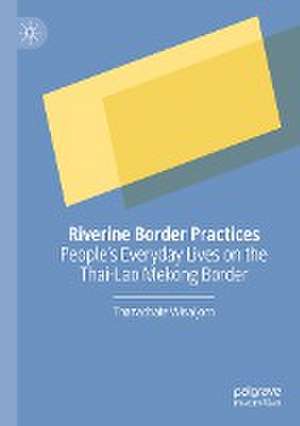Riverine Border Practices: People's Everyday Lives on the Thai-Lao Mekong Border
Autor Thanachate Wisaijornen Limba Engleză Paperback – 3 noi 2022
This book focuses on the ways in which unofficial modes of border crossings are practised by the Thai Ban, along the Mekong Thai-Lao border. In doing so, the book assesses how these border crossings can be theorised as a contribution to existing literature on borderland studies. With that, the book discusses the importance of the notion of the Third Space and its effects on the pluralities of border-crossings in the borderland by weaving together spatial negotiations, temporal negotiations, and negotiations of political subjectivity.
To illustrate the importance and complexity of the notion of the Third Space, the borderland of Khong Chiam-Sanasomboun, an area composed of quasi-state checkpoints as well as mobile checkpoints, is used as a case study. The author employs an ethnographic approach using the four methods of participant observations, interviews, interpreting visual presentations, and essay readings to examine the everyday practices of the Thai Ban people in crossing the border between the riverine villages in the two nation-states of Thailand and Lao PDR.
With this, the findings in the fieldwork reveal that people engaged in everyday border-crossings in the riverine area do not simply embrace or reject the existence of Thai-Lao territory. Most of the time, the stance of Thai Ban people is the mixture of subversion, rejection, and acceptance of the boundary resulting in the sedentary assumption in the form of Thai-Lao territory co-existing with people’s everyday mobility.
| Toate formatele și edițiile | Preț | Express |
|---|---|---|
| Paperback (1) | 721.19 lei 43-57 zile | |
| Springer Nature Singapore – 3 noi 2022 | 721.19 lei 43-57 zile | |
| Hardback (1) | 726.37 lei 43-57 zile | |
| Springer Nature Singapore – 2 noi 2021 | 726.37 lei 43-57 zile |
Preț: 721.19 lei
Preț vechi: 879.50 lei
-18% Nou
Puncte Express: 1082
Preț estimativ în valută:
138.00€ • 144.45$ • 114.86£
138.00€ • 144.45$ • 114.86£
Carte tipărită la comandă
Livrare economică 31 martie-14 aprilie
Preluare comenzi: 021 569.72.76
Specificații
ISBN-13: 9789811628689
ISBN-10: 9811628688
Pagini: 204
Ilustrații: VIII, 204 p. 71 illus., 11 illus. in color.
Dimensiuni: 148 x 210 mm
Greutate: 0.26 kg
Ediția:1st ed. 2022
Editura: Springer Nature Singapore
Colecția Palgrave Macmillan
Locul publicării:Singapore, Singapore
ISBN-10: 9811628688
Pagini: 204
Ilustrații: VIII, 204 p. 71 illus., 11 illus. in color.
Dimensiuni: 148 x 210 mm
Greutate: 0.26 kg
Ediția:1st ed. 2022
Editura: Springer Nature Singapore
Colecția Palgrave Macmillan
Locul publicării:Singapore, Singapore
Cuprins
Chapter 1: Introduction - The end of the Mekong riverine borderland as a Third Space.- Chapter 2: Border conceptualisation of the academia and the Thai Ban’s everyday life in other areas of Thai-Lao Mekong borderlands.- Chapter 3: Spatial negotiation - State space and lived space of the Thai Ban.- Chapter 4: Temporal negotiation in the borderland as a Third Space.- Chapter 5: Negotiations of political subjectivities - Pluralities of border-crossings on the Thai-Lao Mekong border.- Chapter 6: Pluralities of border-crossings in the Third Space.- Chapter 7: Conclusion.
Notă biografică
Thanachate Wisaijorn is currently a lecturer in Political Science (International Relations) at Ubon Ratchathani University. His research interest include International Relations Theory, Geopolitics, Borderland Studies, and Mekong Studies.
Textul de pe ultima copertă
This book focuses on the ways in which unofficial modes of border crossings are practised by the Thai Ban, along the Mekong Thai-Lao border. In doing so, the book assesses how these border crossings can be theorised as a contribution to existing literature on borderland studies. With that, the book discusses the importance of the notion of the Third Space and its effects on the pluralities of border-crossings in the borderland by weaving together spatial negotiations, temporal negotiations, and negotiations of political subjectivity.
To illustrate the importance and complexity of the notion of the Third Space, the borderland of Khong Chiam-Sanasomboun, an area composed of quasi-state checkpoints as well as mobile checkpoints, is used as a case study. The author employs an ethnographic approach using the four methods of participant observations, interviews, interpreting visual presentations, and essay readings to examine the everyday practices of the Thai Ban people in crossing the border between the riverine villages in the two nation-states of Thailand and Lao PDR.
With this, the findings in the fieldwork reveal that people engaged in everyday border-crossings in the riverine area do not simply embrace or reject the existence of Thai-Lao territory. Most of the time, the stance of Thai Ban people is the mixture of subversion, rejection, and acceptance of the boundary resulting in the sedentary assumption in the form of Thai-Lao territory co-existing with people’s everyday mobility.
Thanachate Wisaijorn is currently a lecturer in Political Science (International Relations) at Ubon Ratchathani University. His research interest include International Relations Theory, Geopolitics, Borderland Studies, and Mekong Studies.
Caracteristici
Focuses on how unofficial modes of border-crossing can be theorised as a contribution to existing borderland studies Reveals the stance of Thai Ban people is the mixture of subversion, rejection, and acceptance of the boundary Discusses the notion of Third Space and pluralities of border-crossings
